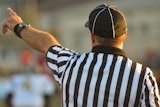
The University of Michigan is launching the Alumni Brain Health Study to research the long-term impacts of college athletics participation and concussions on neurological health.
As reported by Nadia Taeckens of The Michigan Daily student newspaper, the pilot study is being conducted by the university's Concussion Center in coordination with the UM athletic department. The study will compare data from alumni who were athletes at Michigan and those who weren’t. All alumni in the study must have graduated at least 10 years ago.
Dr. James Eckner, associate director of research for the Concussion Center, told The Michigan Daily the survey-based pilot study will lay the groundwork for further exploration of the relationship between concussions and brain health and help establish what sample size and funds may be needed for a future project.
“(What) we’re currently doing … is a pilot study and it’s limited to a web-based survey,” Eckner said. “The goal is that we will take what we learned from the pilot study and develop it into a larger future study that would include additional data collection, potentially including in-person kind of assessments, potentially neuroimaging (and) potentially blood biomarkers.”
According to Eckner, the survey will include questions about concussion history, demographics, cognitive function, mood and sports participation, including pre-college, during college and post-college participation.
“We get about as granular as you can get in an online survey,” Eckner said, as reported by Taeckens of the Daily. “We try to get a kind of a well-rounded picture of the respondent, but again the main things relate to the sport history, concussion history and cognitive and mood standardized outcomes.”
It's estimated that between 1.6 million and 3 million sports-related concussions occur each year in the U.S, Taeckens reported, citing research published by the National Institutes of Health. Eckner told the Daily that questions remain about why some athletes develop brain health issues later in life, while others do not.
“Some sets of former athletes, as they age, seem to develop neurological problems,” Eckner said. “They seem to be related to the history of concussions and the impacts that they experienced when they were younger.”
He added that the study holds the potential to help better inform individuals and organizations.
“We think that if [relationships between athletics, concussions and brain health] and potential long-term effects are better understood, they can help inform policy and inform regulations to try to help make sports safer globally,” Eckner said. “And then at an individual level, we think that if individual athletes and their families have better information, they can make better decisions about what sports they would like to play when they balance the risks and the benefits of the sport.”





































